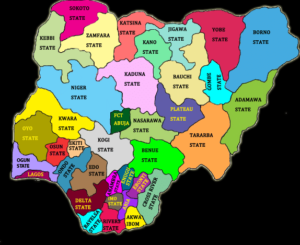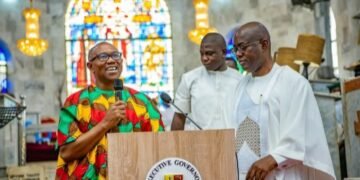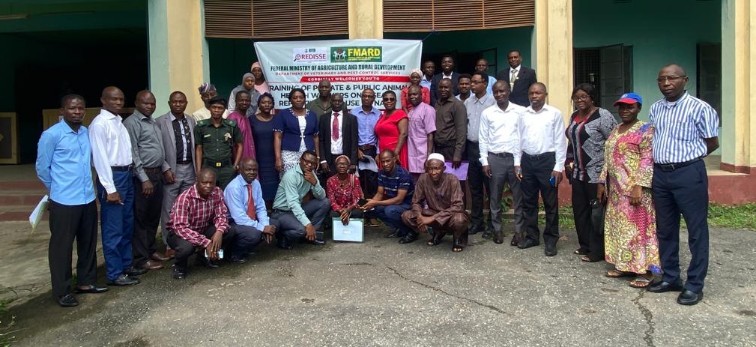“Bad leadership has been the most enduring and damaging affliction affecting Nigeria. However, with concerted efforts from both leaders and citizens, the nation can overcome the challenge.”
While natural disasters are what they are called, natural occurrences often ascribed to acts of God, bad leadership is a man-made catastrophe that has plagued Nigeria since its independence in 1960. This persistent issue has stifled development, eroded public trust, and perpetuated cycles of poverty and corruption. The good news, however, is that, unlike natural calamities, the disaster of poor leadership is preventable and rectifiable.

Source ResearchGate
Inept leadership from 1960
The journey of Nigeria since independence has been marred by a series of leadership failures. The First Republic was short-lived, succumbing to a military coup in 1966, leading to a civil war that lasted until 1970. Subsequent military regimes and civilian administrations have struggled with governance, often prioritising personal or sectional interests over national unity and development. The lack of visionary leadership has resulted in missed opportunities for economic growth and social cohesion.
Leadership and entrenched corruption
Corruption has become synonymous with governance in Nigeria. From the widely reported infamous looting of public funds by former military ruler Sani Abacha, with over $480 million forfeited to the US government, to the fuel subsidy scams that have siphoned billions from the national treasury, the pattern is clear.
The US Department of Justice announced the forfeiture of over $480 million stolen by former Nigerian dictator Sani Abacha. In the same vein, Reuters had reported a $6.8 billion fuel subsidy fraud scandal in Nigeria.
Transparency International (TI) once ranked Nigeria 150 out of 175 countries in its 2022 Corruption Perception Index, highlighting the pervasive nature of graft. (Nigeria’s ranking and score can be found on Transparency.org).
Leadership and nepotism
Nepotism undermines meritocracy and fuels ethnic tensions. Under President Muhammadu Buhari’s administration, there were widespread allegations of lopsided appointments favouring certain regions in Nigeria, leading to public outcry and a sense of marginalisation among other groups. Such practices erode national unity and hinder the development of a competent and inclusive civil service.
The perception of nepotism is yet to take a back seat in Nigeria in the quest for a cohesive national unity and enduring development, as some sections of the country are alleging nepotism, ethnicity and lopsidedness in federal appointments under the present President Bola Tinubu administration.
Leadership and stunted national growth
Despite its abundant natural and human resources, the economic growth of Nigeria has been stunted. In 2023, Nigeria’s GDP per capita stood at approximately $1,621, significantly lower than Malaysia’s $11,648, a country that had a similar economic standing in the 1960s.
According to Macrotrends, Malaysia had a GDP per capita of $11,649 for 2023. The same report stated that the GDP per capita of Nigeria for same year was $1,621. Just last February, the International Monetary Fund (IMF) disclosed that the country’s GDP per capita has gone down drastically to $835.
Factors such as inconsistent policies, infrastructural decay, and poor investment in critical sectors have largely contributed to this underperformance in Nigeria.
Leadership as bad examples for followership
The conduct of leaders sets the tone for societal behaviour. When public officials engage in corrupt practices, flout the rule of law, and prioritise personal gain over public service, it sends a message that such behavior is acceptable. As it is applicable to Nigeria, this trickle-down effect fosters a culture of impunity and erodes the moral fabric of society.
Disconnect between rulers and the ruled
One of the most critical impediments to national development is the persistent disconnect between political leaders and the citizenry. In many countries, particularly in post-colonial states like Nigeria, rulers often ascend to power through systems that prioritise personal gain and elite interests over public service. This detachment manifests in governance models that are unresponsive to the real needs of the people, resulting in policies that neither reflect popular aspirations nor solve pressing societal problems.
This disconnect breeds lack of trust and civic disengagement. When citizens feel unheard and underserved, they withdraw from the political process, creating a vacuum that is filled by authoritarian tendencies, corruption, and impunity. The case of Nigeria is a clear example of this factor.
Importance of focused, rational and patriotic leadership
Path to sustainable development of Nigeria hinges on the emergence of leaders who are visionary, accountable, and committed to the common good. Such leaders must prioritise national interests, uphold the rule of law, and implement policies that promote inclusive growth. The success stories of countries like Singapore and Rwanda underscore the transformative power of dedicated leadership.
Followership as good citizens
While leadership is crucial, the role of the citizenry cannot be overstated. Active civic engagement, holding leaders accountable, and participating in democratic processes are essential for good governance. However, and according to the Independent National Electoral Commission (INEC), voter turnout in Nigeria has been on a decline, with only 34.75 per cent participation in the 2019 presidential elections, down from 69.1 per cent in 2003.
The 2023 general election was markedly characterised by voter apathy as majority of eligible Nigerians stayed away from exercising their constitutional right during the elections. This apathy undermines the democratic process and allows poor leadership to persist.
Synergy between leadership and followership
A nation’s progress is the product of a collaborative effort between its leaders and citizens. When leaders are transparent and accountable, and citizens are engaged and vigilant, it creates a conducive environment for development. This synergy is vital for building resilient institutions and fostering national unity.
Solutions and roadmap for reform
To address the challenges of bad leadership, the following measures are recommended:
Bridging the gap between rulers and the ruled: This is very essential for inclusive and sustainable development. This requires participatory governance, transparency, and leaders who are in touch with the grassroots. Without this connection, even the best-designed policies risk failure due to lack of buy-in or local relevance. Ultimately, nations, Nigeria inclusive, grow when leaders govern with empathy, legitimacy, and a commitment to shared prosperity.
Electoral reforms: Strengthening the independence and capacity of INEC to conduct free and fair elections. Implementation of electronic voting and result transmission to enhance transparency.
Anti-corruption measures: Empowerment of anti-corruption agencies like the Economic and Financial Crimes Commission (EFCC) and the Independent Corrupt Practices Commission (ICPC) with autonomy and resources to investigate and prosecute corruption cases effectively. The example of China, where public corruption is an aberration that attracts the capital punishment can be replicated here in Nigeria.
Merit-based appointments: In Nigeria, there should be an enforcement of policies that prioritise competence and diversity in public appointments to promote inclusivity and efficiency in governance.
Civic education: Implement nationwide civic education programs to enlighten citizens on their rights and responsibilities, fostering a culture of accountability and participation.
Youth engagement/participation: In the quest to ensure sustainable development in Nigeria, there must be the encouragement of youth participation in the leadership process, politics and governance by creating platforms for their voices to be heard and their talents harnessed.
Judicial reforms: It must be ensured that the judiciary is truly independent and adequately funded to uphold the rule of law and adjudicate cases impartially.
Economic diversification: There should be reduction in reliance on oil by investing in other sectors like agriculture, technology, and manufacturing to create jobs and stimulate growth.
Conclusion
Bad leadership has been the most enduring and damaging affliction affecting Nigeria. However, with concerted efforts from both leaders and citizens, the nation can overcome the challenge. By embracing transparency, accountability, and inclusive governance, Nigeria can unlock its vast potential and chart a course towards sustainable development and national prosperity.






























